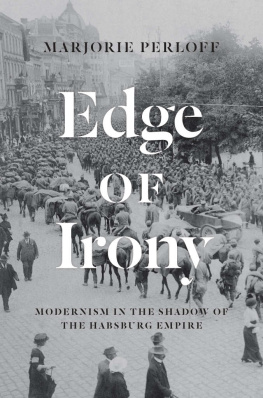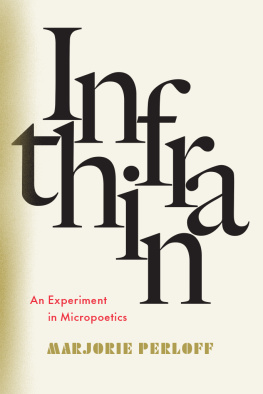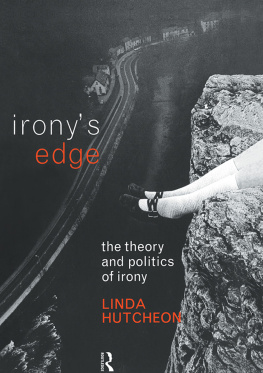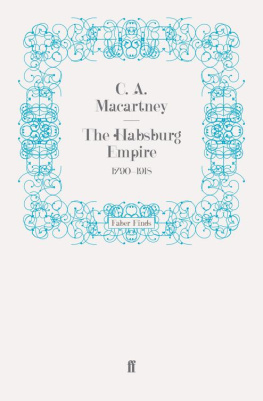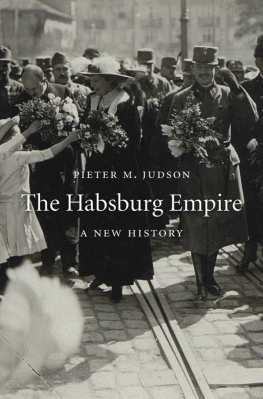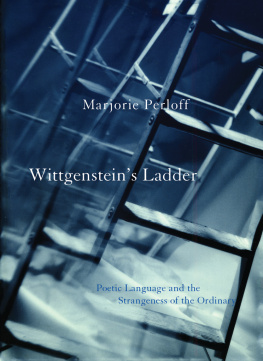Marjorie Perloff - Edge of Irony: Modernism in the Shadow of the Habsburg Empire
Here you can read online Marjorie Perloff - Edge of Irony: Modernism in the Shadow of the Habsburg Empire full text of the book (entire story) in english for free. Download pdf and epub, get meaning, cover and reviews about this ebook. year: 2016, publisher: University of Chicago Press, genre: Romance novel. Description of the work, (preface) as well as reviews are available. Best literature library LitArk.com created for fans of good reading and offers a wide selection of genres:
Romance novel
Science fiction
Adventure
Detective
Science
History
Home and family
Prose
Art
Politics
Computer
Non-fiction
Religion
Business
Children
Humor
Choose a favorite category and find really read worthwhile books. Enjoy immersion in the world of imagination, feel the emotions of the characters or learn something new for yourself, make an fascinating discovery.
- Book:Edge of Irony: Modernism in the Shadow of the Habsburg Empire
- Author:
- Publisher:University of Chicago Press
- Genre:
- Year:2016
- Rating:4 / 5
- Favourites:Add to favourites
- Your mark:
- 80
- 1
- 2
- 3
- 4
- 5
Edge of Irony: Modernism in the Shadow of the Habsburg Empire: summary, description and annotation
We offer to read an annotation, description, summary or preface (depends on what the author of the book "Edge of Irony: Modernism in the Shadow of the Habsburg Empire" wrote himself). If you haven't found the necessary information about the book — write in the comments, we will try to find it.
Edge of Irony: Modernism in the Shadow of the Habsburg Empire — read online for free the complete book (whole text) full work
Below is the text of the book, divided by pages. System saving the place of the last page read, allows you to conveniently read the book "Edge of Irony: Modernism in the Shadow of the Habsburg Empire" online for free, without having to search again every time where you left off. Put a bookmark, and you can go to the page where you finished reading at any time.
Font size:
Interval:
Bookmark:
Marjorie Perloff
The University of Chicago Press
Chicago and London
MARJORIE PERLOFF is professor of English emerita at Stanford University and the Florence R. Scott Professor of English Emerita at the University of Southern California.
The University of Chicago Press, Chicago 60637
The University of Chicago Press, Ltd., London
2016 by The University of Chicago
All rights reserved. Published 2016.
Printed in the United States of America
The University of Chicago Press gratefully acknowledges the generous support of the Office of the Dean of USC Dornsife College at the University of Southern California toward the publication of this book.
In gypten by Paul Celan reprinted by permission of Suhrkamp Verlag AG.
An earlier version of appeared as Avant-Garde in a Different Key: Karl Krauss The Last Days of Mankind, Critical Inquiry 40, no. 2 (Winter 2014): 31138. Copyright 2014 by The University of Chicago. All rights reserved.
25 24 23 22 21 20 19 18 17 16 1 2 3 4 5
ISBN-13: 978-0-226-05442-1 (cloth)
ISBN-13: 978-0-226-32849-2 (e-book)
DOI: 10.7208/chicago/9780226328492.001.0001
Library of Congress Cataloging-in-Publication Data
Names: Perloff, Marjorie, author.
Title: Edge of irony : modernism in the shadow of the Habsburg Empire / Marjorie Perloff.
Description: Chicago ; London : The University of Chicago Press, 2016. | An earlier version of appeared as Avant-Garde in a Different Key: Karl Krauss The Last Days of Mankind, Critical Inquiry 40, no. 2 (Winter 2014): 31138. | Includes bibliographical references and index.
Identifiers: LCCN 2015038642 | ISBN 9780226054421 (cloth : alk. paper) | ISBN 9780226328492 (e-book)
Subjects: LCSH: Austrian literature20th centuryHistory and criticism. | Modernism (Literature)Austria. | Kraus, Karl, 18741936. Letzten Tage Menschlichkeit. | Roth, Joseph, 18941939, Radetzkymarsch. | Musil, Robert, 18801942. Mann ohne Eigenschaften. | Canetti, Elias, 19051994. Gerettete Zunge. | Canetti, Elias, 19051994. Fackel im Ohr. | Canetti, Elias, 19051994. Augenspiel. | Celan, PaulCriticism and interpretation. | Vienna (Austria)Intellectual life20th century. | AustriaHistory19181938.
Classification: LCC PT3818 .P44 2016 | DDC 830.9/9436dc23 LC record available at http://lccn.loc.gov/2015038642
This paper meets the requirements of ANSI / NISO Z39.48-1992 (Permanence of Paper).
In memoriam Joseph K. Perloff (19242014)
Karl Krauss The Last Days of Mankind
Joseph Roths The Radetzky March
Robert Musils The Man without Qualities
Mother Tongue and Identity Theft in Canettis Autobiography
Paul Celans Love Poetry and the Limits of Language
Wittgensteins Gospels
: Map of Austro-Hungarian Empire (1914)
: Ethnic groups of Austria-Hungary (1910)
: Map of Europe (1922)
: Karl Kraus, Die Fackel, issue 1 (1899)
: Deborah Sengl, installation, Die letzten Tage der Menschheit, act 1, scene 1 (2013)
: Deborah Sengl, installation, Die letzten Tage der Menschheit, act 1, scene 11 (2013)
: House of Andrea Turio, Ruse, Bulgaria (ca. 1900)
: Theater Square, Czernowitz (1905)
: Map: The Breakup of Austria-Hungary (1918)
: Postcard: Jeder Tritt ein Britt (1914)
: Karl Kraus, Schlachtfelder-Rundfahrten im Auto! (1921)
: Theater poster, Vienna: Die letzten Tage der Menschheit (2012)
: Field Marshal Conrad von Htzendorf (1914)
: Rudolf Hermann, Das Gercht (Rumor) (1913/14)
: Der Oberbombenwerfer (ca. 1922)
: Musikverein am Karlplatz, Vienna, main facade (186669)
: Musikverein am Karlplatz, Vienna, Golden Hall (186669)
: Franz Welser-Mst conducts Vienna Philharmonic Orchestra (2011)
: Ringplatz, Brody, Galicia (ca. 1910)
: Druckerei Feliks West, Brody, Galicia (ca. 1910)
: Heiligengeistplatz, Lemberg (late nineteenth century)
: Akademiestrasse, Lemberg (late nineteenth century)
: Adam Albrecht, Fieldmarshal Radetzky during the Battle of Novara, March 23, 1849 (1853)
: Stefansplatz, Vienna (ca. 1910)
: Graben, Vienna (ca. 1900)
: Graben, Vienna (ca. 1922)
: World War I Red Cross ambulance (ca. 1922)
: Elias Canettis birthplace, Ruse, Bulgaria (2009)
: Main square, Ruse, Bulgaria (ca. 1900)
: Cathedral of the Holy Spirit, Czernowitz (1864)
: Czernowitz synagogue (1877)
: Gruss aus Czernowitz, Ringplatz (2008)
: Theater, Czernowitz (1905)
: Classic Tyrolean loden wool jacket, 1930s
For a young child, even a Jewish child, brought up as I was in the shaky little Republic of Austria between the two world wars, nothing was more glamorous than the tales of the Habsburg emperors, from Rudolf I (121891), to the bold Emperor Maximilian (14591519), immortalized in Drers great portrait, who secured the Netherlands, Hungary, Bohemia, and Spain for the Habsburgs, and especially to Empress Maria Theresa (171780), that powerful sovereign who presided over her vast empire, orchestrating both the War of the Austrian Succession and the Seven Years War (both against Prussia), while bearing her husband Francis I sixteen children, one of whom was Marie Antoinette. Stories about Maria Theresa were the stuff of legend and fairytale. The child Mozart, for example, having performed for the empress, evidently jumped on her lap and kissed her; she rewarded him with a little suit decorated with gold braid. A devout Catholic, Maria Theresa was staunchly anti-Protestant and even more virulently anti-Semitic, but as Austrian children, we knew only the tuneful songs and happy anecdotes about the great empress.
The year 1867 marked the official establishment of the Austro-Hungarian Empire or Dual Monarchy; it was also the year that the long-lived Emperor Franz Josef (18301916) decreed emancipation for the Jews. The empire, a collage of the most various ethnicities and cultures, was always fragile, but somehow it held together, producing what were generally considered the golden years that preceded the Great Wargolden years at least for the upper classes and a rising bourgeoisie, if hardly for the masses. In June 1914, on a tour in the restless Serbian province of Sarajevo, the unpopular Austrian crown prince Franz Ferdinand and his wife Sophie were assassinated by a Serb terrorist named Gavrilo Princip. Within little over a month, Austria-Hungary and Germany were at war with Serbia and Russia to the east, England, France, and Italy to the west. In November 1918, with the final victory of the Western powers, now including the United States as well, the Habsburg Empire quite simply collapsed. It seemed to happen overnight: millions of the empires citizensthose that had survived the Great Warsuddenly found themselves assigned to newly created nation-states.
I have always been interested in this terrible and poignant turn in European history, partly because it represents my own ancestry, partly because the last days of the empire had bred such brilliant composers as Gustav Mahler (from a large poor family in Bohemia), such novelists as Joseph Roth (from Galicia), and such poets as Paul Celan (Bukovina). Sigmund Freud and Ludwig Wittgenstein were children of the empire, as was Franz Kafka. And although the Weimar Republic always gets pride of place when German Modernism is discussed, the post-empire Austrian world looks increasingly important for an understanding of our own artistic and cultural values a century later.
In the Anglophone world, however, Austro-Modernism remains almost wholly unknown. True, Freud is a household name, known especially in its adjectival form (Freudian). True, Mahlers symphonies are regularly performed by the major orchestras, and the paintings of Gustav Klimt and Egon Schiele are owned and exhibited by leading museums. But the writers? Outside of German departments (a now shrinkingindeed often disappearingentity in the United States), I find that as major a literary figure as Karl Kraus is virtually unknown. When I mention Roth to friends and colleagues, they assume I mean Philip Roth or perhaps Henry (
Font size:
Interval:
Bookmark:
Similar books «Edge of Irony: Modernism in the Shadow of the Habsburg Empire»
Look at similar books to Edge of Irony: Modernism in the Shadow of the Habsburg Empire. We have selected literature similar in name and meaning in the hope of providing readers with more options to find new, interesting, not yet read works.
Discussion, reviews of the book Edge of Irony: Modernism in the Shadow of the Habsburg Empire and just readers' own opinions. Leave your comments, write what you think about the work, its meaning or the main characters. Specify what exactly you liked and what you didn't like, and why you think so.

